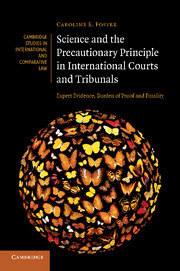 Science and the Precautionary Principle in International Courts and Tribunals
Science and the Precautionary Principle in International Courts and Tribunals Book contents
8 - Reassessment proceedings and res judicata
Published online by Cambridge University Press: 11 April 2011
Summary
The previous chapter dealt with two procedural avenues that could be helpful in dealing with situations where it is asserted that new scientific evidence requires an international adjudicatory decision to be reconsidered. However, it was found that neither the revision procedure nor the doctrine of nullity offers the type of process that may be needed. This final chapter therefore proposes the institutionalisation of reassessment proceedings for disputes involving scientific uncertainty, drawing on experience in the WTO in the Continued Suspension of Obligations cases. Additionally the chapter addresses the application of the rules on res judicata in subsequent proceedings in scientific cases.
‘Reassessment’ proceedings would be concentrated on assessing an original respondent's compliance with its international legal obligations at the point in time after new scientific research has been invoked. A number of factors point to the need to treat the idea of reassessment with caution. There are obvious problems in providing what would be an opportunity for a reasonably full rehearing. Making use of such a procedure would consume considerable resources, and the procedure is open to abuse. The issues lying behind ongoing litigation in disputes involving potential future harm may in some instances be social and political, and ongoing litigation may not be the best way to resolve them. Further, for all concerned it is most desirable to make an enduring decision at the time of the original proceedings.
- Type
- Chapter
- Information
- Science and the Precautionary Principle in International Courts and TribunalsExpert Evidence, Burden of Proof and Finality, pp. 318 - 340Publisher: Cambridge University PressPrint publication year: 2011


